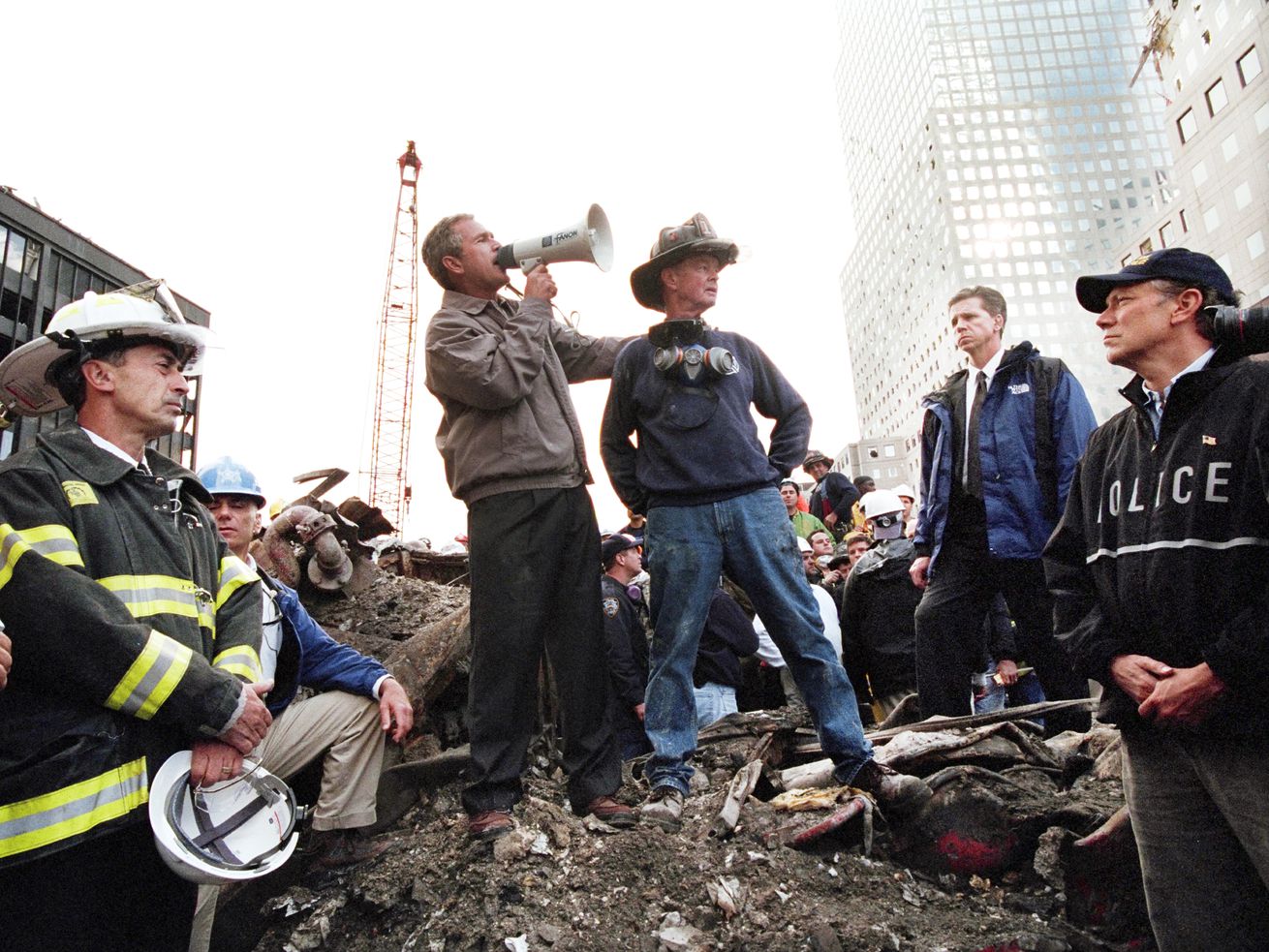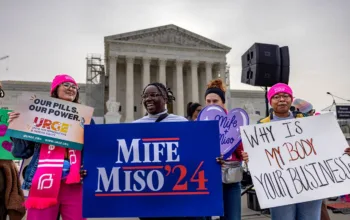Spencer Ackerman on Trump, Obama, and the self-fulfilling logic of the war on terror.
Did 9/11 pave the way for Donald Trump?
That’s a big question, and until I read Spencer Ackerman’s new book, Reign of Terror: How 9/11 Destabilized America and Produced Trump, I hadn’t really thought about it. Ackerman is a longtime national security journalist who’s covered the “war on terror” since its inception roughly two decades ago.
Ackerman’s answer to the above question is yes, but his thesis is even more pointed: The war on terror — and the panoply of excesses it unleashed — eroded the institutional armor of American democracy and left the country defenseless against its own pathologies. And those pathologies, which Ackerman lays out with meticulous attention, prepared the ground for a figure like Trump.
Reading Ackerman’s book was a bit of a whirlwind. I was 19 years old when the Twin Towers fell. I’ll never forget watching the planes hit the wall. I’ll never forget how confused and angry I was. And I’ll never forget the thoughts running through my mind as I realized I was heading to boot camp in just four months.
Still, 9/11 seems so distant and trying to follow the thread over the past 20 years is daunting. But there is a thread and if you track it closely enough you can see how profoundly that event changed our politics and culture.
So I reached out to Ackerman for a forthcoming episode of Vox Conversations to talk about how the war on terror upended American politics and set us on a glide path to nativism and lawlessness. We also discuss the failures of Democrats like Barack Obama to course-correct, and why the end of the conflict of Afghanistan does not mean the end of the war on terror as we know it.
A transcript, edited for length and clarity, follows.
Sean Illing
I want to start by flashing back to 9/11, which seems like a lifetime ago. You said, “I have to admit that after 9/11, I swallowed that red pill myself. Even after I thought I spat it out over the carnage of Iraq, it took me years to recognize its lingering effects.”
That resonates with me, because I departed for boot camp four months almost to the day after 9/11. And I remember watching those towers fall from my apartment, and I remember the rage and the confusion I felt. I remember how eager I was to go “over there” and do … something.
I’ve come to see things very differently since, for all kinds of reasons we’ll get into here, but I did want to start by just asking how that moment changed you, or at least temporarily scrambled your worldview.
Spencer Ackerman
I’m a native New Yorker. I live in the same Brooklyn neighborhood where I was born and raised. I was not in New York when the towers got struck. I was in New Jersey, at Rutgers University, where through a weird series of events, I went to college. And I remember that that morning I was supposed to cover some minor campaign stop by Jim McGreevey, who was running for governor that summer, that was in New Brunswick. And I was living in a group house and I went downstairs and my roommates were just looking at a TV and sobbing. And the panic that went through me, the feeling of not being able to get back home was really overwhelming, to be real about it.
I certainly was not thinking in terms of historical context, or in terms of any material grievance. I had yet to really understand it, but everyone in a position of authority was articulating a response that was just simple rage, and turning trauma into something that could be exploited for violence. And I was not questioning that at all.
I also felt something that could have been the seeds of a much better response to 9/11 was something that didn’t come from the political leadership, but just came from Americans who got in their cars from wherever around the country and drove to Manhattan to try and help. People lining up to give blood. There was a lot of solidarity that people wanted to express to make sense of the trauma that they felt.
And instead, the leadership of this country harnessed it, harnessed the very real pain of New Yorkers who just watched nearly 3,000 of their neighbors die a horrible death, and used it to turn it into something that would deny our other neighbors of their freedom, exclude them from the so-called national unity, and insisted upon exploiting all of this pain to turn it into something useful from the perspective of American hegemonic interests globally.
I wrote it in the book, to both make it clear that I am no exception here and that I don’t write this out of some kind of self-righteous anger. I write it out of shame, and identification that this kind of barbarism resonated with me as well. And it took me, I think way too long to recognize for years and years and years after, that every last service member in Iraq needed to be withdrawn and withdrawn quickly.
But I still didn’t always recognize or understand the ways in which that feeling, and the way in which the political, journalistic, intellectual explanations on offer had inclined me in subtle ways to interpret the world the way they did. Sometimes I didn’t recognize that was there, working as an assumption, but it was definitely there. It was there in all of the pieces of journalism that I didn’t produce, that looked not at the policies, but at the human beings whose lives were destroyed by those policies.
Sean Illing
It’s much easier to reflect soberly from our perch today on all the misadventures and the tragedies of the last 20 years. But that moment was intense and traumatic and chaotic. And I think a lot of us were overcome by some of those unhelpful emotions. And I just at least wanted to acknowledge that before we dig into what happened since.
It’s obviously very hard to summarize our collective response to that national trauma, which involved a wave of legislation and the construction of various agencies and bureaucracies. But was there a unifying thread to all these things that captured the country’s reaction to that event?
Spencer Ackerman
Yes. It’s called American exceptionalism. It was, and is, a way of ordering the world that says America constructs what it calls the rules-based international order, which is to say an international architecture through which first it operates in a leading role. And second of all, the outcomes of it, while not always and not guaranteed, are throttled in such a way that it benefits the extent of American political and economic order.
It also says that the United States does not have to feel itself bound by the architecture it creates. And perhaps most fundamentally, it says that America acts, America is not acted upon. That was the violation that policymakers felt, as they interpreted the trauma of 9/11.
This also helps you understand that American exceptionalism is basically the geopolitical version of white innocence. America has never been immune from history. It tries to escape from history, and say that it’s not culpable for history, not culpable for things that it does to millions, tens of millions, hundreds of millions of people.
Sean Illing
We’re fast-forwarding a little bit to the present, but I think we should. How did that reaction, how did that posture, this idea that we’re locked in a civilizational drama … how does that lead to Trump?
Spencer Ackerman
So in that response, in the pathologizing of Muslims, of Islam, of the Arab world in particular, to spread culpability and deflect any discussion of how America’s extant, hegemonic, violent, and exploitative policies in the Muslim world contribute to a demand for the kind of psychotic political violence that Bin Laden is offering. As that takes hold, so do very old, historically rooted nativist currents in American history, expressed openly by pundits who are openly calling for the American military to invade their lands, convert them to Christianity.
Really, the name is a social compromise, to not say “the war on radical Islamic terror.” But it’s not a war on terror, because we see very quickly that not everyone’s terror is the subject of the war on terror. White people’s terrorism, the oldest, most violent, most resilient terrorism in American history, is expressly not part of this, and becomes — as one FBI veteran told me much, much later — it becomes the lowest priority for FBI counter-terrorism.
Evangelical leaders, people with tremendous followings, tremendous political influence as well as spiritual influence, settle on this very explicitly in 2002 as their explanation, and preach from the Southern Baptist Convention and other fora that this was Islam’s “mask off” moment, that now it’s not just coming for Israel, it’s coming for America, which is also a deep misunderstanding, and a deliberate one, of the Israeli-Palestinian “conflict.”
This starts expanding dramatically particularly when the first Black president gets elected. Among the things that this constituency is stoked to believe is that he is an enemy of the United States, by virtue not just of being Black, but through the meme of birtherism. The war on terror is right there, because it’s calling Obama a secret foreign Muslim.
Obviously, we should just pause to say that this is a lie. But nevertheless, this found purchase, because it was so aggressively cultivated by people like Donald Trump, who as every New Yorker, particularly of my age knows, has played this casually violent nativism for his entire public career, and makes sure as well that he’s present at these moments of eruption.
/cdn.vox-cdn.com/uploads/chorus_asset/file/22835112/Cover.Reign_of_Terror.jpg)
Sean Illing
That speaks to another crucial theme in the book, which is that Trump understood something about the war on terror that many liberals and Democrats did not. You write that “he recognized that the 9/11 era is grotesque subtext to the perception of non-whites as marauders, even as conquerors from hostile foreign civilizations was its engine.” And by understanding that, he was able to appear hostile to the war on terror, by virtue of the contempt that he expressed for it on the campaign trail.
But what he objected to wasn’t the war itself, it was our unwillingness to be even more brutal. Beyond his grotesque rhetoric, how did Trump actually escalate the brutality of the war on terror, or did he?
Spencer Ackerman
He did, in a variety of specific and concrete ways. To itemize just a few: In 2018, I discovered that the first two years of Barack Obama’s presidency were a high-water mark of US drone strikes around the world. In 2010, they a very narrow area of Pakistan, basically the size of the New York greater tri-state area, one every three days. Just imagine that. Imagine if there was an airstrike in the greater New York area for an entire year, an average of once every three days. We don’t journalistically usually talk about it in those terms, but it’s important, I think, that we do, because it reveals the reality of what this campaign was.
Trump escalated that. Even before 2018 was finished, Trump had launched more drone strikes than Obama at the height of the drone war. Before suing for peace with the Taliban, he escalated the war in Afghanistan. He acquiesces to H.R. McMaster and Jim Mattis, who were in the Trump administration to try at the very least make sure that he keeps the war on terror going, and doesn’t stop it in any real way.
He repeatedly lies and says that he’s pulling US troops out of Syria, when in fact he doesn’t. What he does is pull them away from the Kurdish forces that the US and Syria relied upon, at extreme cost, to destroy the ISIS caliphate in Syria and let their Turkish enemies run riot against them. Trump didn’t even withdraw those forces from Syria. He just simply pulled them back away from their battlefield allies.
No one in the United States, from a policymaker perspective, a congressional perspective, a media perspective, really pays any attention at all to the US and US-backed war in Somalia. Many times we’ve called Iraq or Afghanistan, varyingly, “the forgotten war.” But Somalia is a war that’s old enough to have a bat mitzvah. Trump escalates that war like no one else has. In the way that Obama is synonymous with drone strikes in, particularly, Pakistan and Yemen, Trump ought to be synonymous with drone strikes in Somalia. His presidency wages the war in Somalia like never before, and then withdraws forces to great fanfare.
For all of my criticisms of Barack Obama’s presidency as it drew the United States into the Syrian civil war, it’s not Obama who ultimately takes cruise missile strikes against Bashar al-Assad’s forces, it’s Donald Trump. And of course, the constant encouragement and nudging of white supremacist terrorism here in the United States.
And then finally, on the streets of various American cities last summer, Trump uses the mechanisms of the war on terror against anti-fascist protesters, putting surveillance over 15 cities via aerial drone against protestors who are calling for black liberation, having the Department of Homeland Security stuff protesters in Portland into unmarked vans for detention and so on. This is Trump waging the war on terror. I call it in the book, “allowing the war on terror to be its most authentic self.”
Sean Illing
Maybe we just answered this, but why couldn’t Democrats, why couldn’t Obama escape the gravity of the war on terror? Why did they get sucked into the same self-fulfilling vortex?
Spencer Ackerman
They buy into American exceptionalism. I argue in the book that this is a downstream consequence of the Democratic Party’s divorce from its former base in the labor movement. As the Democratic Party becomes less of a working-class party, becomes less receptive to democratic interests and far more receptive to upper middle class and wealthy interests. It goes searching for a post-Cold War justification for it that it finds largely in conceptions of humanitarianism, that it basically puts in fatigues and calls the responsibility to protect.
And that ideology doesn’t cohere. But in the context of the war on terror, it kind of doesn’t need to. It just needs to be interpreted within the war on terror. And that’s where a lot of liberal journalists and intellectuals go. The policymakers themselves are in far more of a reactive position, facing just a deep, deep fear that they’ll never enjoy power again if they oppose any aspect of the war on terror. And this is ultimately the glide path for the Democratic Party’s elites to march into Iraq.
But from the intellectual perspective amongst liberal elites, the ideas that carried the day were that the war on terror could be a valorous struggle, that saved people from the nightmares of these despotic rules by the Taliban, or Saddam Hussein, through the righteous application of American violence on their behalf. Which is what imperialism always justifies itself as accomplishing, delivering security and justice when in fact it delivers only extraction, death, and injustice.
Sean Illing
Let me hold on that for a second, because what you’re saying now really highlights this tragic contradiction that Democrats marched right into. They couldn’t let go of the war on terror for all these political reasons, or they could have, but they —
Spencer Ackerman
They chose not to. This is always a choice.
Sean Illing
So they tried to manage and bureaucratize it, but the longer it persisted, the more it failed, and the more it fostered the undercurrents that propped it up in the first place. And here we are.
Spencer Ackerman
And what I think doesn’t always get as appreciated, but is critical context for understanding someone like Trump and how he was so able, without incurring any consequence within the Republican Party that had been so devoted to the war on terror for saying “These wars have been stupid,” because throughout the Obama administration, no one wants to say yet that they are lost wars, but it’s obvious that they haven’t delivered what they promised. And they’ve only delivered agony and suffering and increased terrorism, increased the ambition and scope and opportunities of what becomes the Islamic state, which would never have existed had the US not invaded Iraq.
But through the Obama administration’s maintenance of the war on terror, it becomes, not particularly conspicuous to the political class, but very conspicuous to Trump’s coalition, that these disastrous wars now look a whole lot like wars waged by the Democratic Party.
Sean Illing
The way you put it in the book is to say that Obama tried to put the forever war on a sustained footing. What does that actually mean in practice?
Spencer Ackerman
What it meant was compiling internal committees of lawyers, intelligence officials, senior military officers, and high-ranking political appointees who would come together in a bureaucratic process that meted out the war on terror, through most often drone strikes and counter-terrorism raids. This was seen as a way of making the war on terror respect the law.
But the thing is that the law wasn’t respected. What happened was lawyers in the Obama administration and in the intelligence community and in the military found justifications for what Obama already wanted to do, to the point where two attorneys, David Barron and Marty Lederman in the Justice Department (Barron was rewarded for this with a federal judgeship), told Barack Obama that despite the Constitution’s prohibitions on depriving someone of life without due process of law, that it could simply execute an American citizen named Anwar al-Awlaki, who was an important and even operational figure in Al-Qaeda in Yemen. Someone who the war on terror radicalized into becoming a radicalizer of other people, including the Detroit underwear bomber, Umar Farouk Abdulmutallab.
Probably not the last time that we will see [that], as long as the war on terror persists.
We might perhaps better appreciate it when remembering that in the summer of 2020, the Trump administration maneuvered a lot of the mechanisms of the war on terror against its domestic opponents. There’s going to be another right-wing administration. It will probably look more like Trump’s than not. It may be more competent and it may be bolder, and it will have a precedent blessed by Obama’s Justice Department that says if it’s too hard to kill people, you declare to be dangerous terrorists, just … sorry.
That, stripped of euphemism, stripped of self-conception, was Obama’s war on terror.
I asked Ben Rhodes, who was one of his, probably his most left-wing policy aide, why they didn’t dismantle the war on terror, particularly after they had the opportunity once they killed Bin Laden. And his answer was, “Imagine if he does what you wanted him to do and there’s another terrorist attack and the world ends.”
And what he really means is not the world ending, but that’s the end of Obama’s presidency, if he follows what my advice would have been. But that is not something that had to happen, first of all, if Obama made a thoroughgoing case for why the war on terror is a generator or of its own security threats to Americans, as he kind of edges toward on a couple occasions in his presidency.
Also that the maintenance of the war on terror had demonstrably made Americans less safe, not alleviated their security concerns. And so while, of course, Obama would have been demagogued for having done that, the only way you can stand up to the demagoguery is by actually standing up to it, and making an affirmative case for why the war on terror is a failure of profound consequence.
Sean Illing
It does speak to the political logic that makes the forever war forever. But there is a bridge here between Obama and Biden. And obviously, we’re talking a week after the official end of the Afghanistan war. What do you make of Biden’s withdrawal from Afghanistan? And what do you make of the reaction to it?
Spencer Ackerman
So from a top-line perspective, withdrawing from Afghanistan is absolutely the right thing to do. Every year that we were in Afghanistan, Afghanistan grew more chaotic. The Taliban grew stronger. So there’s never a better time to withdraw from Afghanistan than yesterday. And the second-best time is always going to be today. The worst time is always going to be tomorrow.
These stories, if you were reading Afghanistan coverage or performing Afghanistan coverage, since 2020 and before, were constantly there. The anxieties of a return to Taliban rule were not obscure things. They’re foreseen and foreseeable things. They were foreseen things. And the Biden administration, particularly once it became clear that there wasn’t going to be a peace process, that the Taliban was just winning, including in the areas of Northern Afghanistan that they had never held when they were first in power, the situation becomes quite dire.
I think I’ve described it as a moral floor that operated as a moral ceiling. The United States created millions of refugees in Afghanistan. And if you didn’t serve the war effort, if you merely sought to endure and survive it, you weren’t going to be on those planes. You were not going to be the people whose lives America was interested in saving.
For all of the reaction that has occurred, with journalists, in particular, rending their garments about the very real human disaster that America is responsible for, what I see is people expressing their anger that 20 years of war seemingly ended suddenly and yielded nothing. When in fact, these were the consequences of 20 years of war.
Sean Illing
You closed the book by saying that it’s difficult to see America as anything more than its war on terror. And I don’t know if I’d put it that way, but I would say that Americans have so internalized the war on terror — its ethics, its excesses, its failures — that we can’t even see beyond it. It’s just in the ether now. And the whole thing feels like a metaphor for the slow-motion death of the American empire.
Spencer Ackerman
I think an appropriate point to end on is to underscore what the war on terror is, and why it has to be abolished, why it can’t be reformed, and what it ultimately means.
We’re recording this on a day when Brown University’s Costs of War Project has put out its latest estimate of the consequences of the war on terror. This is a very conservative tally. It finds well over 900,000 people killed by the war on terror, and $8 trillion in money that I think is best described as looted.
The Afghanistan war didn’t rebuild Afghanistan. The Afghanistan war rebuilt Northern Virginia. The Afghanistan war, like the war on terror beyond it, enriched a very small and exceedingly politically powerful private interest, which is the defense industry. The defense industry functions as what I think you could say is the American variant of state capitalism.
This is an enterprise that operates as a tremendous force, not just for inertia in the American empire, but its growth. Obviously, we paid for the war on credit. … What would you rather have spent that on?
Author: Sean Illing
Read More



